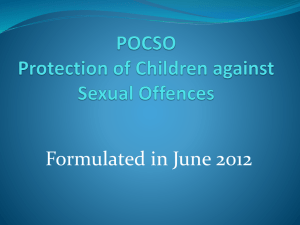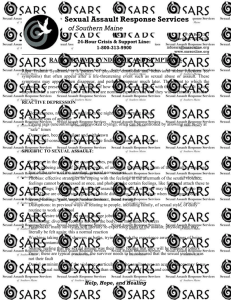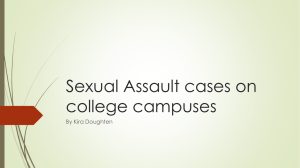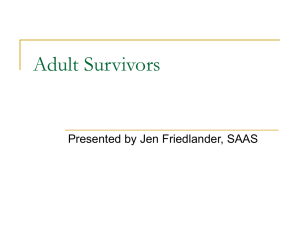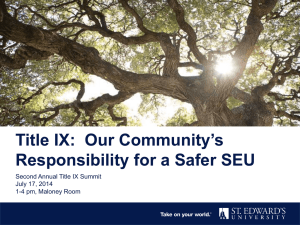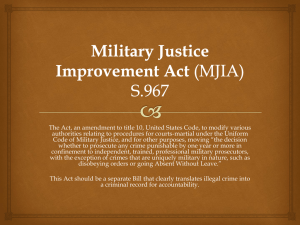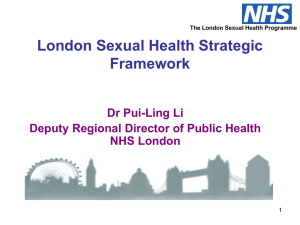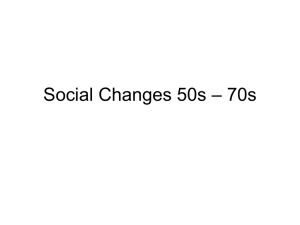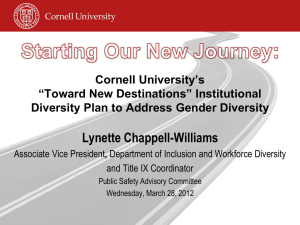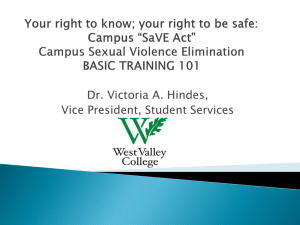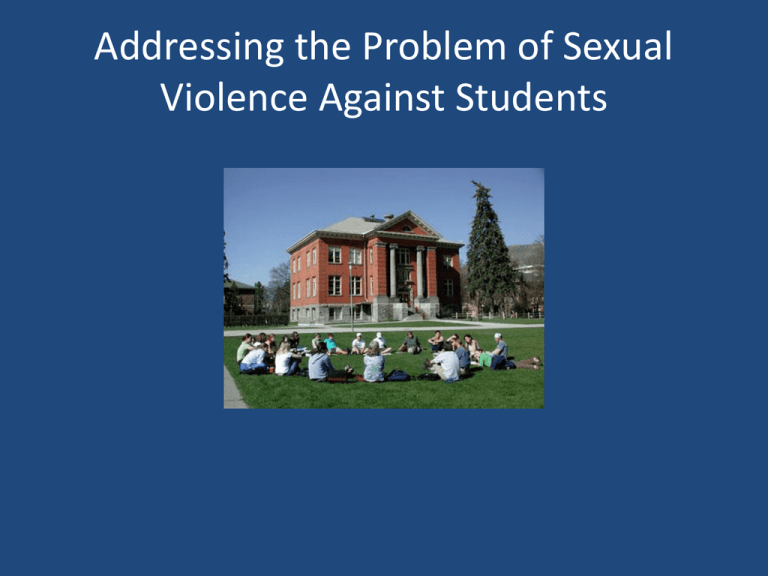
Addressing the Problem of Sexual
Violence Against Students
THE PATH
•
•
•
•
Enhanced Understanding
Legal Framework
Practical Challenges
Opportunities for
Improvement
• University Protocol &
Resources
Title IX and the Dear Colleague Letter
Title IX of the Education Amendments of 1972 prohibits
discrimination on the basis of sex in any federally funded
education program or activity. ED issued the DCL on April 4,
2011, to explain the requirements of Title IX to cover sexual
violence and to remind schools of their responsibilities to take
immediate and effective steps to respond to sexual violence.
“Knows” or “Reasonably should know”
Legal Requirements
• Requirement to take immediate and
appropriate action to determine what
occurred.
• Prompt & effective steps to:
– End sexual violence
– Prevent recurrence
– Address its effects
Legal Requirements
• Interim steps to protect complainant
• Grievance procedure
•
•
•
•
•
•
Equal opportunities for all parties
Preponderance of the evidence standard
No mediation
All parties notified of the outcome
Reasonably prompt time frames
May not wait for criminal justice system
Context
• “When young women get to
college, nearly 20% of them will
be victims of attempted or
actual sexual assault, as well as
about 6% of undergraduate
men.”
• Victims of sexual assault are
more likely to suffer
academically and from
depression, post-traumatic
stress disorder, to abuse alcohol
and drugs, and to contemplate
suicide.
• Acts of sexual violence are vastly
underreported.
Challenge
Survivor Hesitation to Report
• Unclear it was a crime
• Self blame
• Not wanting anyone to know
• Fear of getting in trouble for policy violation
• Difficulty understanding what happened
• Identification as LGBT
• Fear of losing social support
• Fear of reprisal from assailant
• Lack of memory of what happened
Opportunity
•
•
•
•
•
Overcome Survivor Hesitation to Report
Training & Education
Reinforce support for survivors
Provide immediate resources for survivors
Provide clear and easy to access for reporting
Challenge
Poor Coordination & Communication
• Lack of cooperation between campus and
police
• Complaint and reporting process confusing
• Confusion about prosecution
• Fear of the unknown
Opportunity
Overcome poor coordination and communication
• Training & Education
• Clear and accessible policies and procedures
• Central coordination
• Clearinghouse for information
• Regular communication
University Policy
The University of Montana fosters a safe learning and
working environment that supports academic and
professional growth of students, staff, and faculty and has
zero tolerance for sexual misconduct, sexual harassment,
relationship abuse and violence, and stalking regardless
of gender, sexual orientation, disability, race, ethnicity,
class, religion, or relationship status. When incidents
occur, the University will hold perpetrators accountable
through appropriate disciplinary actions, while respecting
the rights of survivors, in accordance with federal and
State law, the University's Student Conduct Code, and
other applicable University policies.
University Policy
• Employees must report information they have about sexual
assaults of students to the Title IX Coordinator.
• Survivor name not required.
• Exemptions from reporting exist for employees who serve
in a professional role in which communication is privileged
under Montana law (e.g., medical providers, licensed
professional counselors, rape crisis counselors).
University Policy
• University sexual assault team will immediately determine:
– Appropriate scope of investigation balancing any
confidentiality request of survivor and safety of
community;
– Appropriate communication with local law enforcement
authorities;
– Possible Clery Act or other campus notification.
University Policy
The Title IX Coordinator will investigate the
situation and take steps to ensure that any
ongoing harassment is stopped, future
harassment is prevented, and to the extent
possible that the effects of any harassment are
remedied. The Title IX Coordinator will also
ensure that interim measures are taken to
ensure the safety of the survivor and that the
survivor’s educational experience is not
jeopardized.
Resources
• The Student Assault Resource Center (SARC) provides free and
confidential services for students of UM who have experienced
sexual or relationship violence, stalking, or harassment. SARC has a
24 hour help line: 406.243.6559. Going to SARC does not trigger a
report of sexual assault.
• First STEP provides medical care and evidence collection for victims
of sexual assault, in a safe and private environment, 24 hours of the
day. (406.329.5776). Nurses are trained to collect evidence,
administer medication for the prevention of STD’s and pregnancy
and provide information and referrals. If an individual thinks that
he or she has been drugged, First STEP will provide toxicology
testing. All services are provided at no cost to the survivor and
evidence can be stored for up to one year. Going to First STEP does
not trigger a report of sexual assault.
Resources
• Curry Health Center (CHC) Medical Clinic is available to UM
students. (406.243.2122). CHC can assist with most
medical concerns, pregnancy and STD testing following an
assault. CHC does not collect evidence in cases of sexual
assault. Going to CHC does not trigger a report of sexual
assault.
• The Title IX Coordinator in the Office of Equal Opportunity
& Affirmative Action will take reports of sexual assault,
sexual violence, stalking and any other form of sexual
harassment against a UM student or employee.
(406.243.5710).
• The Dean of Students will investigate reported cases of
interpersonal violence and sexual assault in accordance
with the Student Conduct Code. (406.243.6413).
Supporting a Survivor
• When an individual chooses to open up to you about an assault,
respect the trust he or she has put in you.
• Your job in that moment is to believe them and help them access
appropriate resources.
– It is not your job to ask for facts.
• You may call the SARC crisis line.
• Advise the student that you will be required to report to the Title IX
Coordinator.
Thank You &
Go Griz!


